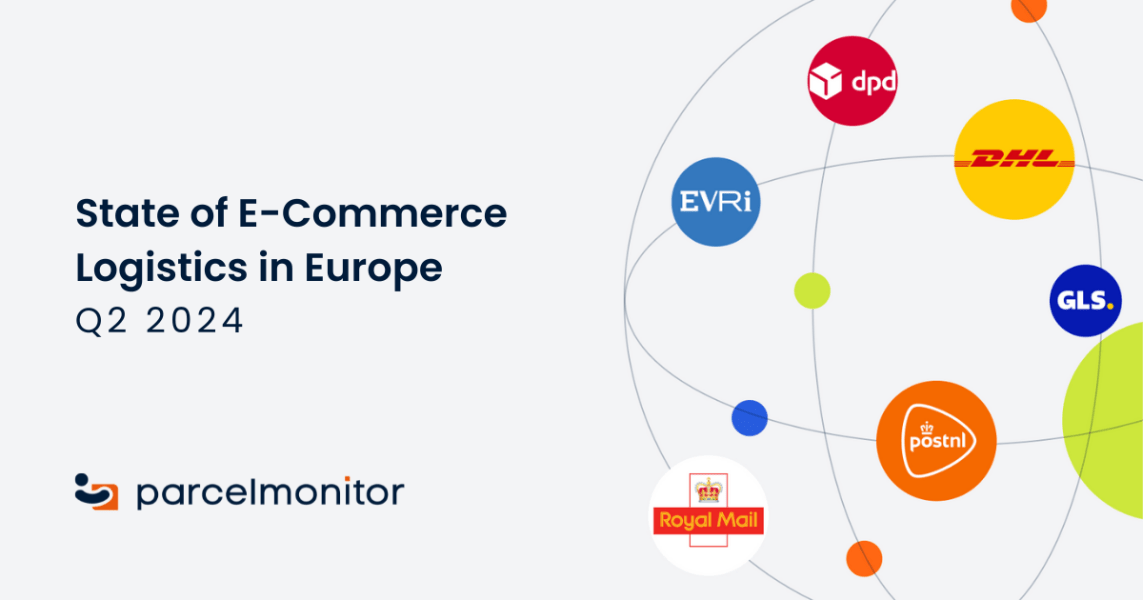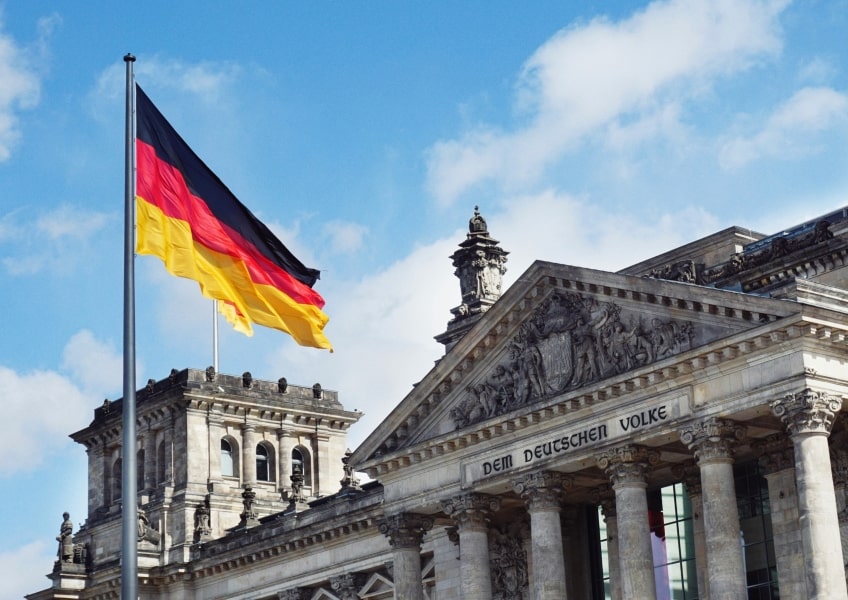Q2 2024: state of e-commerce logistics in Europe
Written by
Editorial TeamPublished on
Discover the latest insights into Europe’s e-commerce logistics with Parcel Monitor’s Q2 2024 report. Uncover key performance metrics and trends driving growth across major markets—click to explore the data that powers global logistics decisions. (Ad)

(Image Source: Parcel Monitor)
Commercial collaboration
E-commerce has transformed the retail industry by allowing people to buy goods and services online anywhere. In the second quarter of 2024, Europe’s e-commerce logistics sector displayed a blend of impressive achievements and areas of potential growth across crucial domestic and cross-border trade routes. The industry is set to reach important milestones, with estimated sales of US$632.70 billion this year and nearly doubling to US$977.40 billion by 2029. This development has been facilitated by a rising user base, with online consumers estimated to reach 446.1 million by the end of the decade.
In this growing e-commerce industry, leading carriers, including DPD, DHL Paket, Evri, PostNL, GLS, and DHL Parcel, are leading the way. These companies are fostering advanced innovations, enhancing their operational capacities, and establishing new standards for performance indicators.
This report, part of Parcel Monitor’s E-Commerce Logistics Race series, will examine essential performance metrics for European e-commerce logistics companies in Q2 2024, including transit durations, first-attempt delivery success rates, and on-time delivery ratios. It will also offer a thorough analysis of the present situation and projected trajectory of e-commerce logistics in the major European markets.
Top Domestic Trade Routes in Europe
The Netherlands, Germany, and the United Kingdom are crucial parts of Europe’s domestic trade routes because of their advantageous geographic locations, strong economies, and cutting-edge infrastructure.
Located in the center of Europe, Germany serves as a central hub for transportation, establishing effective rail and road networks connecting Eastern and Western Europe. The Netherlands’ proximity to the North Sea and the Port of Rotterdam makes it the main point of entry and exit for products into and out of Europe. In addition, the UK’s economic size and proximity to continental Europe—connected by the Channel Tunnel and important ports—keep it a significant trading partner even after Brexit.
These nations work together to promote economic integration and expansion by enabling the smooth flow of commodities throughout Europe.
The United Kingdom (GB-GB)

(Image Source: Unsplash)
The United Kingdom (UK) is one of Europe’s and the world’s most developed and established e-commerce markets. With a population of over 69 million and a high Internet penetration rate of 97.8%, the country has a sizable and lucrative online customer base for local and foreign businesses. Besides, it has made significant strides in efficiency and reliability in 2024.
With an estimated US$129.70 billion in e-commerce revenue in 2024, the UK is Europe’s most developed e-commerce industry. With an average transit time of 1.2 days and a first-attempt delivery success rate of 95.2%, its e-commerce logistics industry has demonstrated notable efficiency and dependability in Q2 2024. The UK also has a low carrier issue ratio of 1.18%
- DPD UK Had the Fastest Average Transit Time: In Q2 2024, DPD UK, a prominent participant in the UK’s e-commerce logistics market, surpassed Royal Mail and Evri with the fastest average transit time of 1.11 days. This result is better than the 1.2-day national average. The success of DPD UK may be ascribed to effective routing technologies and a robust delivery network that guarantee on-time deliveries.
- Evri Recorded an Outstanding First Attempt Delivery Success Ratio: Well-known for its dependable delivery services, Evri surpassed DPD and Royal Mail in Q2 2024 with a first-attempt delivery success ratio of 97.61%. This result is superior to the 95.2% national average. What has led to Evri’s success is its strategic use of technology and customer-centric approach, which includes investing £1 million in AI strategy.
- Royal Mail Achieved the Least Carrier Issue Ratio: Royal Mail, the UK’s national postal service, had the lowest carrier issue ratio in Q2 2024, at 0.77%. It was much lower than the national average of 1.18%. This performance outperforms both DPD (2.31%) and Evri (4.62%). Royal Mail’s low issue ratio can be attributed to its long expertise, stringent quality control methods, and commitment to maintaining high service standards, which result in fewer delivery difficulties.
Germany (DE-DE)

(Image Source: Unsplash)
As one of the most dynamic economic sectors, Germany’s e-commerce market continues to grow, adapting to new technical advancements and shifting customer demands. Its revenue is expected to rise at an annual pace of 8.23%, reaching US$98.31 billion in 2024 and perhaps US$146.00 billion by 2029. Furthermore, the country’s e-commerce user base is predicted to grow to 51.8 million by 2029, demonstrating the rising popularity of online purchasing.
Germany demonstrated its effectiveness in e-commerce logistics in Q2 2024, with an average transit time of 1.44 days and a first-attempt delivery success rate of 94.39%. Additionally, the nation’s on-time delivery ratio of 95.37% shows how dependable its logistics networks are. As of Q2 2024, the carrier issue ratio is 3.13%.
- DHL Paket Achieved an Impressive First-Attempt Delivery Success Ratio: DHL Paket is a significant competitor in the German logistics sector. In the second quarter of 2024, it outperformed GLS Germany and DPD with a 94.79% first-attempt delivery success ratio. This achievement is due to the company’s efficient delivery network and high customer satisfaction. It just established its largest completely automated robotic fulfillment facility in Germany.
- GLS Germany Had the Fastest Transit Time: Known for its dependable delivery services, GLS Germany beat DHL Paket and DPD in Q2 2024 with the quickest delivery time of 1.32 days. Thanks to a vast network of almost 6,000 vehicles transporting parcels and well-optimized logistics procedures, this performance outperforms the 1.44-day national average.
- A Higher Percentage of Parcels Delivered by DPD Encountered Issues: DPD had a 10.13% issue ratio in Q2 2024, greater than DHL Paket and GLS Germany. The carrier was responsible for 2.36% of the issues, while recipients accounted for 7.78%. In addition, external factors such as barricades, protests, and weather interruptions worsened the situation. DPD could expand its predictive analytics and increase customer communication to improve this metric.
The Netherlands (NL-NL)

(Image Source: Unsplash)
With an exceptional yearly growth rate of 9.05%, the Netherlands‘ revenue is predicted to reach US$33.62 billion in 2024 and potentially reach US$51.84 billion by 2029. Transport providers in the Netherlands are aggressively researching enhanced methods for shipping, monitoring, and delivering items throughout Europe as online shopping continues to grow and the need for effective logistics grows.
The Netherlands showed remarkable logistics performance in the second quarter of 2024, with an average transit time of 1.16 days and an impressive first-attempt delivery success rate of 96.01%. Additionally, the nation’s remarkable 98.66% on-time delivery ratio highlights the effectiveness and dependability of its logistical networks. Furthermore, it recorded a carrier issue ratio of 6.33%.- PostNL Had the Fastest Average Transit Time of 1.13 Days: With an average transit time of 1.13 days in Q2 2024, PostNL—a significant competitor in the Dutch logistics market—bested DHL and DPD, which both had average transit times of 1.22 days. This metric surpassed the 1.16-day national average. PostNL’s solid logistical network, which comprises 3,500 collecting points and well-planned delivery routes, is the key reason behind its efficiency.
- DHL Achieved the Best First-Attempt Delivery Success Ratio: With a first-attempt delivery success ratio of 98.24% in Q2 2024, DHL — a key logistics operator in Europe—surpassed DPD (92.52%) and PostNL (95.81%). This achievement is superior to the 96.01% national rate. Due to its sophisticated tracking systems and customer-focused delivery tactics, DHL Parcel consistently achieves high success rates, guaranteeing that packages are delivered to recipients on the first attempt.
- DPD Recorded the Lowest Carrier Issue Ratio in Q2 2024: A key participant in the global logistics sector, DPD outperformed both PostNL (6.08%) and DHL (6.14%) in Q2 2024, with the lowest carrier issue ratio of 1.56%. The company’s proactive issue resolution processes and strict quality control systems, which guarantee fewer delivery issues, are responsible for its low issue ratio.
Conclusion
Due to expansion in major markets, Europe’s e-commerce logistics landscape is changing. Germany demonstrates robust growth and sustainable delivery solutions, while the UK leads with its sophisticated logistical capabilities and low issue rates. Moreover, the Netherlands shines in efficiency and quick delivery.
Logistics providers throughout these countries are concentrating on technology developments and infrastructure upgrades as the European e-commerce business grows, with estimates of reaching roughly US$1 trillion by 2029. Additionally, they are investing in state-of-the-art logistics technologies to boost first-attempt success rates, decrease carrier-related problems, and accelerate delivery times. Because of this, European e-commerce logistics businesses are in a solid position to provide dependable and high-quality services while satisfying the expanding demands of their online consumers.
About Parcel Monitor
Your gateway to real e-commerce logistics data worldwide.
Parcel Monitor is the trusted source of e-commerce logistics insights – powered by real consumers’ order data. With a global network spanning over 1078+ carriers, 170+ countries and 60,000+ shipping routes, Parcel Monitor provides an accurate reflection of the e-commerce industry by tracking millions of parcels daily.
Parcel Monitor is recognized as a reputable data source within the global logistics sector, endorsed by prominent publications like The Washington Post and The New York Times and . frequently collaborates with industry leaders such as Rakuten Insights, CBRE, Transport Intelligence, and eMarketer.
***


